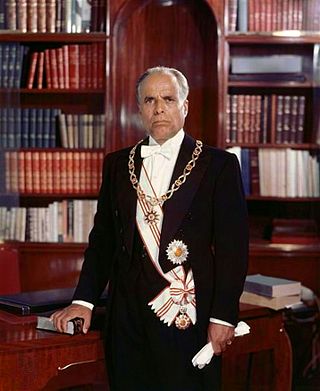Related Research Articles

The politics of Tunisia takes place within the framework of a unitary semi-presidential representative democratic republic, with a President serving as head of state, Prime Minister as head of government, a unicameral legislature and a court system influenced by French civil law. Between 1956 and 2011, Tunisia operated as a de facto one-party state, with politics dominated by the secular Constitutional Democratic Rally (RCD) under former Presidents Habib Bourguiba and then Zine el Abidine Ben Ali. However, in 2011 a national uprising led to the ousting of the President and the dismantling of the RCD, paving the way for a multi-party democracy. October 2014 saw the first democratic parliamentary elections since the 2011 revolution, resulting in a win by the secularist Nidaa Tounes party with 85 seats in the 217-member assembly.

Zine El Abidine Ben Ali, commonly known as Ben Ali or Ezzine, was a Tunisian politician who served as the 2nd president of Tunisia from 1987 to 2011. In that year, during the Tunisian revolution, he fled to Saudi Arabia.

Habib Bourguiba was a Tunisian lawyer, nationalist leader and statesman who led the country from 1956 to 1957 as the prime minister of the Kingdom of Tunisia (1956–1957) then as the first president of Tunisia (1957–1987). Prior to his presidency, he led the nation to independence from France, ending the 75-year-old protectorate and earning the title of "Supreme Combatant".

The Beylik of Tunis, also known as Kingdom of Tunis was a largely autonomous beylik of the Ottoman Empire located in present-day Tunisia. It was ruled by the Husainid dynasty from 1705 until the abolition of the monarchy and the establishment of the French protectorate of Tunisia in 1881.

Hédi Baccouche was the Prime Minister of Tunisia from 7 November 1987 to 27 September 1989. Baccouche led the Socialist Destourian Party until it changed its name to the Constitutional Democratic Rally in 1988. He was born in Hammam Sousse.
In its modern history, Tunisia is a sovereign republic, officially called the Republic of Tunisia. Tunisia has over ten million citizens, almost all of Arab-Berber descent. The Mediterranean Sea is to the north and east, Libya to the southeast, and Algeria to the west. Tunis is the capital and the largest city ; it is located near the ancient site of the city of Carthage.

The Tunisian Revolution, also called the Jasmine Revolution, was an intensive 28-day campaign of civil resistance. It included a series of street demonstrations which took place in Tunisia, and led to the ousting of longtime president Zine El Abidine Ben Ali in January 2011. It eventually led to a thorough democratisation of the country and to free and democratic elections.

Ridha Grira is a Tunisian politician.
Mohamed Naceur Ammar is a Tunisian politician. He served as the Tunisian Minister of Communication Technologies under former President Zine El Abidine Ben Ali from January 2010 to January 2011.
Zouheir M'Dhaffar served as the Tunisian Minister of Public Property and Real Estate Affairs under former President Zine El Abidine Ben Ali from January 2010 to January 2011.
Taieb Hadhri served as the Tunisian Minister of Scientific Research, Technology, and Expertise Development under former president Zine El Abidine Ben Ali.
Abderrahim Zouari is a Tunisian politician. He was the Minister of Transport from 2004 to 2011 under President Zine El Abidine Ben Ali. He was the candidate for the Destourian Movement in the 2014 presidential election. In January 2019, Zouari formed a party named Tahya Tounes.
Bibya Chihi is a Tunisian politician. She was the Minister of Women, Family, Children, and Senior Citizens under former President Zine El Abidine Ben Ali. Prior to this, she was the CEO of the Société Nationale de Distribution des Produits Pétroliers.
Mounir Jaidane is a Tunisian politician. He was the Secretary General of the Government under former President Zine El Abidine Ben Ali.
The international reactions to the Tunisian Revolution were generally supportive of the Tunisian people's right to protest, though several governments continued to voice support for President Zine El Abidine Ben Ali up to and even after his government's largely peaceful overthrow in January 2011.

Mohamed Jegham, , is a Tunisian politician and businessman.
Anarchism in Tunisia has its roots in the works of the philosopher Ibn Khaldun, with the modern anarchist movement being first brought to the country in the late 19th century by Italian immigrants. The contemporary anarchist movement arose as a result of the Arab Spring and the aftermath of the Tunisian Revolution.

Ali Chaouch was a Tunisian politician and government minister.
In Tunisia, makhzen was the term used to designate the political and administrative establishment of the Beylik of Tunis before the proclamation of the republic in 1957. The makhzen consisted of families of Turkish origin, or Turkish-speaking mamluks of European origin, intermarried with indigenous Tunisian families who were great merchants or landowners. This network of families dominated the high offices of state, the leadership of the army and the positions of rank and power in the regions outside the capital. They were also closely connected with the senior ulema. These were known as “makhzen families”. Outside of the capital and the major towns, the term 'makhzen' designated not the leading families close to the regime, but those of the interior tribes which had a trusted relationship with the ruling family. Together the great families and the loyal tribes made up the country's 'establishment'.
References
- ↑ CIA World Leaders Archived June 29, 2011, at the Wayback Machine
- ↑ A Directory of World Leaders & Cabinet Members of Foreign Governments: 2008-2009 Edition, Arc Manor, 2008, p. 406
- 1 2 3 4 5 6 Business News